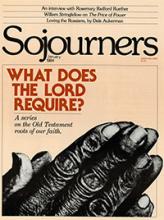Sojourners: What has feminist theology contributed to the church?
Ruether: Feminist theology, it seems to me, has unmasked the sexist structures of church language, theology, and social policies. It is fundamentally challenging the church to recognize the distortion of the Christian message created by the church's patriarchal socialization, and to reconstruct its social patterns, language, and theology to affirm the full humanity of both women and men.
How does feminist theology interact with black and Third World liberation theologies?
There are, I think, two different tendencies in feminist theology: the inclusive and the exclusive. The exclusive tendency sees sexism as the key to all social oppression, so that if one focuses only on sexism, one encompasses the most foundational oppression.
I belong to a different kind of feminist theology that feels that sexism is one of the structures of oppression, and that it is not particularly helpful to create hierarchical rankings of oppressions in which one tries to argue that a particular oppression is foundational. Rather, I would see sexism, racism, classism, and other kinds of oppression as interconnected in an overall pattern of human alienation and sinfulness.
Given the fact that patriarchy is the social context for both the Old and New Testaments, how does feminist theology root itself in the biblical tradition?
Here again we have exclusive and inclusive tendencies. One view sees the Judeo-Christian tradition as so hopelessly patriarchal that women who are concerned about feminism should abandon the tradition altogether and seek some other framework for their spirituality and religion. Others are still struggling to affirm the biblical tradition but have become so discouraged by the pervasiveness of patriarchy that they have begun to doubt whether the biblical tradition is in fact reclaimable.
Read the Full Article

